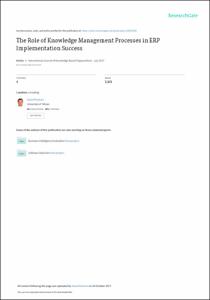Please use this identifier to cite or link to this item:
http://localhost/handle/Hannan/4711
Full metadata record
| DC Field | Value | Language |
|---|---|---|
| dc.contributor | Saeed Rouhani | - |
| dc.contributor | Somayeh Hosseini | - |
| dc.contributor | Mehdi Shami Zanjani | - |
| dc.date.accessioned | 2023-05-04T16:56:44Z | - |
| dc.date.available | 2023-05-04T16:56:44Z | - |
| dc.date.issued | 2017 | en_US |
| dc.identifier.other | DOI: 10.4018/IJKBO.2017070102 | - |
| dc.identifier.uri | http://localhost/handle/Hannan/4711 | - |
| dc.description.abstract | Due to response to the business goals, organizations need to implement enterprise resource planning systems. But the risk of failure in the implementation project of these systems is so high, therefore paying close attention to the effective factors of implementation is very necessary. One of the effective factors is knowledge management (KM). In this study, the role of Knowledge management processes in implementation of enterprise resource planning systems is studied and the existence of knowledge management as a required factor will be emphasized. Research data, in the questionnaire format have been gathered from experts in the field of enterprise resource planning system in Iranian companies. Some of the studied organizations have implemented this system and others were in the implementing phase. Data analysis with structural equation modeling (SEM) methodology by Lisrel software shows positive relation between knowledge management processes and Success of enterprise resource planning system implementation. | en_US |
| dc.language.iso | en_US | en_US |
| dc.subject | Enterprise Resource Planning (ERP) Systems, Knowledge Management (KM), Structural Equation Modeling (SEM), Success | en_US |
| dc.title | The Role of Knowledge Management Processes in ERP Implementation Success | - |
| dc.type | Article | en_US |
| Appears in Collections: | مهندسی فناوری اطلاعات | |
Files in This Item:
| File | Description | Size | Format | |
|---|---|---|---|---|
| 31.pdf | 191.41 kB | Adobe PDF |  Preview File |
Full metadata record
| DC Field | Value | Language |
|---|---|---|
| dc.contributor | Saeed Rouhani | - |
| dc.contributor | Somayeh Hosseini | - |
| dc.contributor | Mehdi Shami Zanjani | - |
| dc.date.accessioned | 2023-05-04T16:56:44Z | - |
| dc.date.available | 2023-05-04T16:56:44Z | - |
| dc.date.issued | 2017 | en_US |
| dc.identifier.other | DOI: 10.4018/IJKBO.2017070102 | - |
| dc.identifier.uri | http://localhost/handle/Hannan/4711 | - |
| dc.description.abstract | Due to response to the business goals, organizations need to implement enterprise resource planning systems. But the risk of failure in the implementation project of these systems is so high, therefore paying close attention to the effective factors of implementation is very necessary. One of the effective factors is knowledge management (KM). In this study, the role of Knowledge management processes in implementation of enterprise resource planning systems is studied and the existence of knowledge management as a required factor will be emphasized. Research data, in the questionnaire format have been gathered from experts in the field of enterprise resource planning system in Iranian companies. Some of the studied organizations have implemented this system and others were in the implementing phase. Data analysis with structural equation modeling (SEM) methodology by Lisrel software shows positive relation between knowledge management processes and Success of enterprise resource planning system implementation. | en_US |
| dc.language.iso | en_US | en_US |
| dc.subject | Enterprise Resource Planning (ERP) Systems, Knowledge Management (KM), Structural Equation Modeling (SEM), Success | en_US |
| dc.title | The Role of Knowledge Management Processes in ERP Implementation Success | - |
| dc.type | Article | en_US |
| Appears in Collections: | مهندسی فناوری اطلاعات | |
Files in This Item:
| File | Description | Size | Format | |
|---|---|---|---|---|
| 31.pdf | 191.41 kB | Adobe PDF |  Preview File |
Full metadata record
| DC Field | Value | Language |
|---|---|---|
| dc.contributor | Saeed Rouhani | - |
| dc.contributor | Somayeh Hosseini | - |
| dc.contributor | Mehdi Shami Zanjani | - |
| dc.date.accessioned | 2023-05-04T16:56:44Z | - |
| dc.date.available | 2023-05-04T16:56:44Z | - |
| dc.date.issued | 2017 | en_US |
| dc.identifier.other | DOI: 10.4018/IJKBO.2017070102 | - |
| dc.identifier.uri | http://localhost/handle/Hannan/4711 | - |
| dc.description.abstract | Due to response to the business goals, organizations need to implement enterprise resource planning systems. But the risk of failure in the implementation project of these systems is so high, therefore paying close attention to the effective factors of implementation is very necessary. One of the effective factors is knowledge management (KM). In this study, the role of Knowledge management processes in implementation of enterprise resource planning systems is studied and the existence of knowledge management as a required factor will be emphasized. Research data, in the questionnaire format have been gathered from experts in the field of enterprise resource planning system in Iranian companies. Some of the studied organizations have implemented this system and others were in the implementing phase. Data analysis with structural equation modeling (SEM) methodology by Lisrel software shows positive relation between knowledge management processes and Success of enterprise resource planning system implementation. | en_US |
| dc.language.iso | en_US | en_US |
| dc.subject | Enterprise Resource Planning (ERP) Systems, Knowledge Management (KM), Structural Equation Modeling (SEM), Success | en_US |
| dc.title | The Role of Knowledge Management Processes in ERP Implementation Success | - |
| dc.type | Article | en_US |
| Appears in Collections: | مهندسی فناوری اطلاعات | |
Files in This Item:
| File | Description | Size | Format | |
|---|---|---|---|---|
| 31.pdf | 191.41 kB | Adobe PDF |  Preview File |
